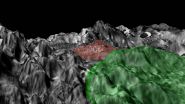(Press-News.org) Why do some countries seem to develop quickly while others remain poor? This question is at the heart of the so-called poverty or development trap problem. Using mathematics on open data sets researchers now present new insights into this issue, and also suggest which countries can be expected to develop faster. The paper is published in the journal Big Data.
Why do some countries seem to develop quickly while others remain poor? This question is at the heart of so-called poverty or development trap problem. Development economists have identified several potential causes of economic development traps, but the issue is complex. Some countries appear to be stuck not only in an economic development trap but also in a political development trap with a lack of democracy.
So far there is a lack of understanding how the different types of development traps are related and how they interact, possibly reinforcing each other. In our paper we have developed a new method to explore multiple traps, Professor David J.T. Sumpter at the Department of Mathematics at Uppsala University says.
The researchers developed the method and applied it to datasets from the World Bank, UN, Freedom House, Human Rights Data Project, World Values Survey etc. They identified two types of political development traps, in addition to an economic development trap. One was institutional, where countries with low levels of economic growth and low levels of education fail to develop democracy. The second trap relates to the values and norms of citizens, which develop more slowly in countries with low levels of democracy and life expectancy.
We show that many developing countries like India, Egypt, Jordan or Ukraine lie near the border of a development trap. We also predict how long it will take for these countries to make a transition toward higher democracy and socio-economic wellbeing, explains Shyam Ranganathan, PhD student at Uppsala University and first author.
They show that this time can vary a lot, since investing a small amount in the right sector at the right moment could help the country to leave a trap. On the other hand for countries further from a threshold, a significant investment has to be made over a longer period of time.
Although we identified relationships between democratic, economic and health related indexes, we should not forget that there remain uncertainties. Events like political changes, conflicts, etc. can lead to sudden changes, says Stamatios C Nicolis, a postdoctoral researcher at Uppsala University.
So while in the long run of 50 to 100 years democratic and economic changes can be expected in most countries, the changes may be delayed or have potential temporal setbacks.
Traps might appear frustrating from a present perspective, but our models show that we have good reasons to expect that in the future most countries will manage to leave the traps and prosper economically and politically. Moreover, investing in core sectors of these countries, like education, is likely to help to shorten the period for these countries to leave development traps, Viktoria Spaiser, also postdoctoral researcher in Uppsala.
INFORMATION:
For more information, please contact Shyam Ranganathan (phone: +46 70 765 59 01 shyam.ranganathan@math.uu.se), Stam Nicolis (+46 72 233 90 22; French/Greek language) Viktoria Spaiser (+46 76 264 0214, viktoria.spaiser@math.uu.se German language) or (David Sumpter, mobile: (+46 70425 0337, david.sumpter@math.uu.se ; Swedish). All authors speak English.
Submarine groundwater discharge (SGD) consists of a mixture of continental freshwater and seawater, which recirculates through the coastal aquifer. In addition to its importance in the water cycle, as a potentially exploitable water resource and a source of water for brackish coastal environments such as marshes and coastal lagoons, it also can serve as an important source of dissolved chemical compounds such as nutrients and trace and toxic metals.
Now, a study led by researchers from the Institute of Environmental Science and Technology (ICTA) and the Department of ...
Scientists have produced a new map of the Moon's most unusual volcano showing that its explosive eruption spread debris over an area much greater than previously thought.
A team of astronomers and geologists, led by experts in the Institute for Computational Cosmology and Department of Earth Sciences at Durham University, UK, studied an area of the lunar surface in the Compton-Belkovich Volcanic Complex.
By mapping the radioactive element thorium which spewed out during the eruption they discovered that, with the help of the Moon's low gravity, debris from the unnamed ...
Singapore, 11 March 2015 - A study led by the Genitourinary (GU) oncology team at National Cancer Centre Singapore (NCCS) has revealed conclusive results in reducing toxicities for Asian patients with metastatic renal cell carcinoma (mRCC) or cancer that has spread beyond the kidney.
The seven-year study began in 2007 and the findings revolutionised the standard protocol for patient management in NCCS with an attenuated-dose regimen of sunitinib for patients with mRCC.
The new treatment regimen for sunitinib has been accepted by oncologists in Singapore. For the patients, ...
The fishing industry will have difficulty complying with new EU Common Fisheries Policy (CFP) rules banning the throwing away of unwanted fish, according to research at the University of Strathclyde.
The aim of the regulations, which come into force in January 2015, is to reduce waste and improve fish stocks - but the Strathclyde study concluded that this outcome was uncertain.
It found that, over time, quantities of fish discarded have declined since the early 1980s - because overall catches have decreased. However, the proportion of catch which is discarded has increased ...
Epilepsy is a very prevalent neurological disorder. Approximately one-third of patients are resistant to currently available therapies. A team of researchers under the guidance of the Institute of Cellular Neurosciences at the University of Bonn has discovered a new cause to explain the development of temporal lobe epilepsy: At an early stage, astrocytes are uncoupled from each other. This results in the extracellular accumulation of potassium ions and neurotransmitters, which cause hyperexcitability of the neurons. The results are being published in advance online in the ...
Chicago, March 18, 2015 - Laboratory testing among patients undergoing cardiac surgery can lead to excessive bloodletting, which can increase the risk of developing hospital-acquired anemia and the need for blood transfusion, according to an article in the March 2015 issue of The Annals of Thoracic Surgery.
Key points
Excessive lab tests prior to and following cardiac surgery can lead to excessive bloodletting, which can increase the risk of developing hospital-acquired anemia and the need for transfusion during surgery.
The study found that heart surgery patients ...
Applications of plasmas in medicine are a new frontier in therapeutic treatment. For example, they can help in stimulating tissue regeneration in the contexts of wound healing and dermatology. Before these and further applications can be developed, it is essential to understand the processes at work in plasmas - a unique kind of gas-like state of matter containing charged particles. Now a study published in EPJ D by a team led by Zoran Petrovi? from the University of Belgrade, Serbia, provides previously unavailable data on oxygen ion transport and the likelihood of such ...
If you put water in the freezer to make ice, you trigger a dynamic phase transition.
Physicists gave that fancy name to a process which takes a system across a phase transition in a realistic time, to distinguish it from the hypothetical process which goes across the transition infinitely slow. This latter, hypothetical case is discussed in any college textbook, while its dynamic, and therefore realistic, counterpart continues to pose fundamental questions. It matters how fast you 'quench' the system: If you cool water below its freezing point slowly, you'll ...
On March 14 and 15, 2015, internationally leading experts in gut microbiota research met in Barcelona, Spain, to present the latest findings and discuss their significance for health and diet. Fact sheets covering the following hot topics from the Summit are now freely available on http://www.gutmicrobiotaforhealth.com/gmfh-2015-media-room.
Breast milk: Protecting infants against diseases
Breast milk can provide the infant's gut with beneficial bacteria that induce protective effects against a number of conditions. Recent findings show that the mother's gut microbiota ...
Our opinions are affected by what our eyes are focusing on in the same instant we make moral decisions. Researchers at Lund University and other institutions have managed to influence people's responses to questions such as "is murder defensible?" by tracking their eye movements. When the participants had looked at a randomly pre-selected response long enough, they were asked for an immediate answer. Fifty-eight per cent chose that answer as their moral position.
The study shows that our moral decisions can be influenced by what we are looking at when we make the decision. ...


